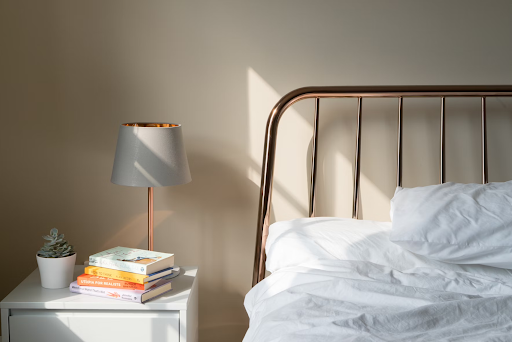6 Ways to Help Get a Dog to Sleep

Author: Jonathan Warren
Most dogs are very energetic creatures. Craving constant attention and activity, their wholehearted enthusiasm and loyalty are why we love to have them in our lives. However, if that energy runs long into the night, it can result in disruptions to your own efforts to relax or to get enough sleep. So how do you get a dog to sleep?
Like all animals, a dog will eventually tire and need sleep in order to regain their energy levels. Boost your own sleep pattern by following these tips to helping a dog get some shut-eye.
1. Get plenty of exercise
Just like us humans, part of staying fit and healthy is getting plenty of exercise. A handy secondary benefit of that is that come bedtime, your dog will have used up their bounds of energy and be ready to nod off.
Depending on the size and breed of your dog, they’ll need a daily walk to ensure a night of uninterrupted sleep. In general, the bigger the dog the longer you’ll need to walk them to tire them out. Grab your dog’s lead and a tennis ball and head out to the local park for a walk.
Aside from walks, you could grab any other opportunities to use up a bit of your dog’s seemingly endless energy reserves. If you’re out in the back garden, grab a Frisbee or ball and play a five-minute game of fetch. It will all count come bedtime.
2. Think about where your dog should sleep
Sometimes we don’t want to be without our dogs at any time, so it can be all too tempting to allow your fluffy, cuddly dog into your bedroom at night. However, if you find it sees you and your dog get a worse night's sleep, you may want to reconsider.
Studies, such as this one reported in Vice, have shown that sleeping with your four-legged friends can easily lead to disruptions during the night. The extra heat in the bed makes it more likely you’ll wake up, as does any movement that will take place throughout the night (which affects both you and your dog).
Plus, the hairs that make their way into the bed can lead to itching and irritation of your skin. This can affect anyone but is particularly disturbing for those with asthma or skin complaints. It can be hard to say no and shut the bedroom door each night, but it can lead to better sleep all round.
3. Create a cosy environment
Dogs are just like us. They want a comfortable bed and a peaceful environment in which to sleep. For that reason, you need to review where your dog is sleeping and make sure it’s as cosy as possible.
Invest in a nice comfortable bed and throw in a blanket and their favourite toys to make it as enticing as possible. Once you’ve nailed the bed, consider the surrounding environment. Is their bed in a warm part of the house? Solid floors beneath the bed might be a little hard or cold, so add a rug beneath the bed for extra warmth. Is it quiet and dark? Noises from outside and streetlights could wake your dog in the night and lead to barking. If you need to, move the bed into a quieter room and use blinds to block out any external light.
4. Stick to a routine bedtime
A dog needs to recognise when it’s almost time to hit the hay. To make sure this is the case, you’ll need to establish a routine. As much as you possibly can, make sure your dog eats their meals at the same time each day and heads out for a walk at roughly the same time. Make sure your last mealtime isn’t too late either, allowing food to digest properly before bed.
When it comes to bedtime, be firm and stick to the routine. Be sure to include a final toilet trip every night; one thing that’s sure to cause problems in the night for a dog is the need to do its business.
5. Consider any disruptions
Changes to general life routine can cause disruptions to sleep too. Think of how you might struggle to sleep if you stop in a hotel for a night. The same logic can be applied to dogs. Have you recently moved home, or had to move your dog’s bed into a different room? If so, it might have a negative effect on their sleep.
When a change in daily routine occurs, allow for some time to adjust. Just ensure you are applying all the other tips we’ve discussed here to allow for a smooth transition.
6. Try sleep-inducing treats
It isn’t recommended that anyone (or any dog) eat shortly before they go to bed, but products do exist that could give your dog that little push into the land of nod. Try bedtime treats with natural, sleep inducing-remedies like chamomile and see if it makes a difference. Just leave enough time for it to digest.
For any dog-related sleep aids, always ask your vet. They might recommend melatonin (a sleep-inducing chemical) supplements or pills that can be added to a dog’s food. Before you try anything, be sure to consult an expert.
How to make your puppy go to sleep
During their first few months, the excitement and energy levels of a puppy can be heightened, as can their sensitivity to disruption. It can make bedtime an even more difficult period. The same advice absolutely applies when it comes to helping a puppy go to sleep, but here are just a few more pointers to help you out.
-
Be patient
You’ll likely encounter problems when a puppy first moves into your home, making patience an even more important virtue. The transition to living in your home will be confusing and scary for puppies, making interruptions inevitable. Be patient until they grow familiar with their surroundings.
-
Leave them be
If you’re happy that you’ve provided everything your puppy needs for a good night’s sleep, try to leave them be until the morning – even if they bark for a short period. Leave them to settle back down and you might find their attempts for late-night attention will stop.
-
Don’t give in
When they’re at their youngest, and cutest, it can be even more difficult to say no and shut puppies away. If you do give in, they will start to become used to sleeping in your room or getting attention when they want it. It will make a smooth, disruption-free night even more difficult to achieve. Stay strong and don’t give in.
In many ways, advice on how to help dogs and puppies to sleep mirrors that of humans. Ultimately, as animals, we have energy reserves that need to be recharged by sleep. Following the tips and guidance above could be the key to nudging your pup to sleep each night.



